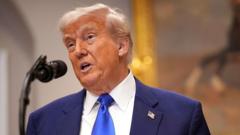In a week marked by global condemnation, Israel's strategies in Gaza spark significant diplomatic tensions, challenging its longstanding support from Western nations.
Diplomatic Shockwaves Hit Israel Amid Rising International Criticism

Diplomatic Shockwaves Hit Israel Amid Rising International Criticism
Israel faces intensified backlash from allies as humanitarian concerns mount over Gaza.
As Israel grapples with an intensifying diplomatic 'tsunami,' this week has highlighted a concerning shift in international sentiment. An alarming headline from Ha'aretz, Israel's liberal daily, succinctly encapsulated the atmosphere: "Diplomatic tsunami nears," signaling widespread discontent over the ongoing military operations in Gaza. The week has been tumultuous for Israel, ignited by the joint condemnation from Britain, France, and Canada on Monday evening, labeling Israel's actions as "egregious."
The mounting international disapproval has not only included governmental statements; it has also resulted in a tangible diplomatic fallout. Following the joint statement, the three nations warned of impending "concrete actions" if Israeli military offensives did not abate and humanitarian aid restrictions were not lifted. Additionally, targeted sanctions were signaled against Israeli settlement activities in the occupied West Bank.
The international backlash has continued to escalate throughout the week. On Tuesday, Britain suspended trade negotiations with Israel and announced a review of ongoing cooperation. The sanctions specifically targeted individuals, including well-known Jewish settlers, and culminated in the summoning of Israel's ambassador to London, an action representative of the gravity of the situation.
As Gaza faces dire humanitarian crises, evidenced by alarming reports of potential mass starvation, international leaders have voiced their concerns. UK's Foreign Secretary David Lammy condemned Israel's rhetoric and actions towards Gaza as "extremism" that was "repellent." This criticism reverberates beyond just words; it indicates a potential shift in longstanding alliances as Israel's Prime Minister Benjamin Netanyahu faces accusations of being beholden to far-right factions that may influence his decisions.
The urgency of humanitarian needs has compelled even staunch defenders of Israel, such as British Prime Minister Sir Keir Starmer, to publicly acknowledge the "intolerable" suffering in Gaza. The unprecedented diplomatic pressure has not gone unnoticed by Netanyahu, who reacted defensively, contending that criticism equates to support for Hamas, thereby drawing lines in the sand with his Western partners.
In an unexpected twist, the murder of two Israeli embassy staffers in Washington has further ignited tensions, with the Israeli government implicating critics of their actions as having blood on their hands. Despite the tragic incident, the broader narrative indicates Israel's increasing isolation as former allies express growing frustration over the ongoing conflict.
Throughout the escalating conflict, a notable silence has emanated from former President Donald Trump, whose position could potentially sway the situation. His recent comments about starvation in Gaza raised questions about his disinterest in taking a more vocal stance amid widespread outrage from other leaders.
As the international community rallies around humanitarian concerns, the pathway forward for Israel remains uncertain, challenged by a growing reckoning that could reshape diplomatic relations for years to come.
The mounting international disapproval has not only included governmental statements; it has also resulted in a tangible diplomatic fallout. Following the joint statement, the three nations warned of impending "concrete actions" if Israeli military offensives did not abate and humanitarian aid restrictions were not lifted. Additionally, targeted sanctions were signaled against Israeli settlement activities in the occupied West Bank.
The international backlash has continued to escalate throughout the week. On Tuesday, Britain suspended trade negotiations with Israel and announced a review of ongoing cooperation. The sanctions specifically targeted individuals, including well-known Jewish settlers, and culminated in the summoning of Israel's ambassador to London, an action representative of the gravity of the situation.
As Gaza faces dire humanitarian crises, evidenced by alarming reports of potential mass starvation, international leaders have voiced their concerns. UK's Foreign Secretary David Lammy condemned Israel's rhetoric and actions towards Gaza as "extremism" that was "repellent." This criticism reverberates beyond just words; it indicates a potential shift in longstanding alliances as Israel's Prime Minister Benjamin Netanyahu faces accusations of being beholden to far-right factions that may influence his decisions.
The urgency of humanitarian needs has compelled even staunch defenders of Israel, such as British Prime Minister Sir Keir Starmer, to publicly acknowledge the "intolerable" suffering in Gaza. The unprecedented diplomatic pressure has not gone unnoticed by Netanyahu, who reacted defensively, contending that criticism equates to support for Hamas, thereby drawing lines in the sand with his Western partners.
In an unexpected twist, the murder of two Israeli embassy staffers in Washington has further ignited tensions, with the Israeli government implicating critics of their actions as having blood on their hands. Despite the tragic incident, the broader narrative indicates Israel's increasing isolation as former allies express growing frustration over the ongoing conflict.
Throughout the escalating conflict, a notable silence has emanated from former President Donald Trump, whose position could potentially sway the situation. His recent comments about starvation in Gaza raised questions about his disinterest in taking a more vocal stance amid widespread outrage from other leaders.
As the international community rallies around humanitarian concerns, the pathway forward for Israel remains uncertain, challenged by a growing reckoning that could reshape diplomatic relations for years to come.





















